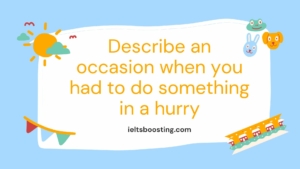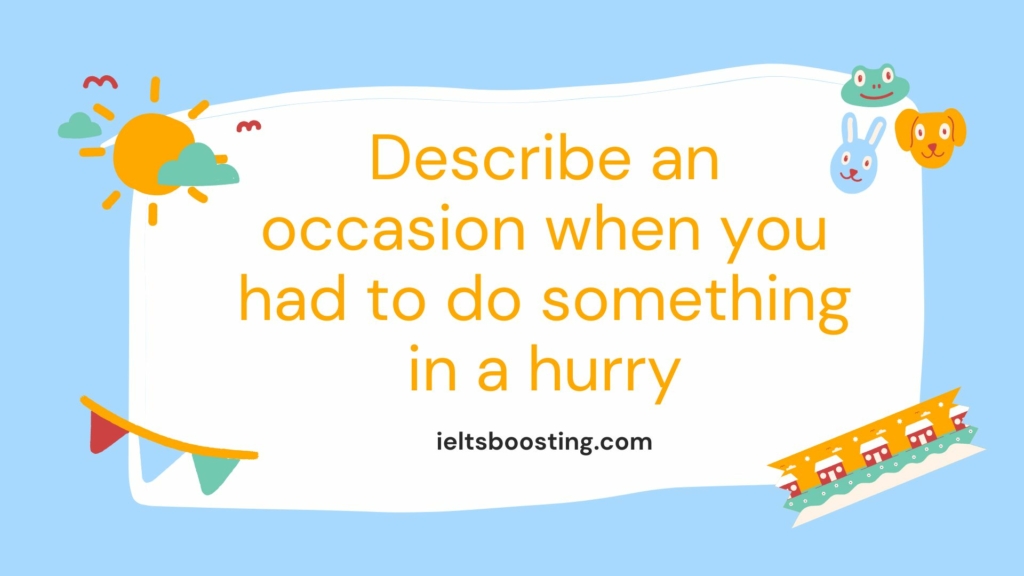Describe an occasion when you had to do something in a hurry
You should say:
- What you had to do
- Why you had to it in a hurry
- How well you did this
- And explain how you felt about having to do this in a hurry

Describe an occasion when you had to do something in a hurry
Sample answer to describe an occasion when you had to do something in a hurry
It was last year, when I had to submit an important assignment for my university course. The deadline was at midnight, and I had only started working on it in the evening. I had procrastinated for a long time, thinking that I had plenty of time to finish it. But I realized that the assignment was more complicated and time-consuming than I had expected. I had to do a lot of research, analysis, and writing in a short period of time. I also had to format and proofread my work before submitting it online.
I had to do this in a hurry because I didn’t want to miss the deadline and lose marks. The assignment was worth 20% of my final grade, and I needed to get a good score to pass the course. I knew that submitting a late or incomplete assignment would have negative consequences for my academic performance and reputation.
I think I did this quite well, considering the time pressure and the difficulty of the task. I managed to finish the assignment just before the deadline, and I submitted it successfully. I was able to cover all the main points and requirements of the assignment, and I used reliable sources and evidence to support my arguments. I also checked my work for any errors or plagiarism, and I followed the appropriate referencing and formatting style.
However, I also felt very stressed and anxious while doing this in a hurry. I was constantly worried that I would not be able to finish the assignment on time, or that I would make a mistake or miss something important. I felt overwhelmed by the amount of work and information that I had to deal with. I also felt guilty and regretful for not starting the assignment earlier, and for wasting my time on other things. I realized that I had poor time management and planning skills, and that I needed to improve them. I promised myself that I would never do this again, and that I would start working on my assignments as soon as possible.
Some useful vocabulary:
- procrastinate: To delay doing something that you should do, usually because you do not want to do it. Eg: I know I should start working on my project, but I always procrastinate and end up doing it at the last minute.
- deadline: A date or time by which you have to do or complete something. Eg: The deadline for the essay is next Friday.
- time pressure: The feeling of not having enough time to do something. Eg: I was under a lot of time pressure to finish the report by today.
- format: To arrange or organize something in a particular way. Eg: I had to format my document according to the guidelines of the journal.
- proofread: To read something carefully and check it for any errors in spelling, grammar, punctuation, etc. Eg: I proofread my essay before handing it in to make sure there were no mistakes.
- submit: To give or send something to someone, especially as part of your work or study. Eg: I submitted my application online through the website.
- feedback: Comments or opinions that someone gives you to tell you how well or badly you have done something. Eg: I received positive feedback from my teacher on my presentation.
- stressed: Feeling worried or nervous about something. Eg: I was very stressed about the exam and couldn’t sleep well.
- anxious: Feeling nervous or worried about something that is going to happen or might happen. Eg: I was anxious about the results and kept checking my email.
- overwhelmed: Feeling that you have too much to do or deal with. Eg: I felt overwhelmed by the amount of work that I had to do in a short time.
- guilty: Feeling that you have done something wrong or bad. Eg: I felt guilty for not helping my friend with his project.
- regretful: Feeling sorry or sad about something that you have done or not done. Eg: I was regretful for not studying harder for the test.
Explore more: ielts speaking part 2

Describe an occasion when you had to do something in a hurry
Part 3-Describe an occasion when you had to do something in a hurry
Do you often make decisions quickly in life?
Yes, I typically make decisions quickly in various aspects of my life. I find that this approach helps me save time and act more efficiently, especially in situations where a prompt decision is required. However, for more significant or complex decisions, I ensure to weigh the options carefully before reaching a conclusion
What are the benefits of making decisions quickly?
Personally, I think that making decisions quickly has many benefits, both for individuals and organizations. First of all, it can save time and money, as it allows people to act faster and more efficiently, without wasting resources or opportunities. In addition to saving time and money, it can avoid stress and anxiety, as it reduces the uncertainty and doubt that often accompany decision-making.
- Efficiently: Performing tasks with the least waste of time and effort.
- Wasting resources: Using resources (time, money, etc.) ineffectively or without producing significant results.
- Opportunities: Favorable circumstances or chances to achieve a desired outcome.
- Uncertainty: Lack of certainty or predictability; a state of not being sure about something.
- Doubt: A feeling of uncertainty or lack of conviction.
- Anxiety: A state of uneasiness or apprehension often accompanied by heightened stress.
- Accompany: To go along with or exist together with.
Do you think we should leave enough time or limited time for the decision-making process?
I think the amount of time we should leave for the decision-making process depends on the situation and the consequences of the decision. Some decisions are urgent and require quick action, while others are complex and need careful consideration. Generally, I prefer to leave enough time to weigh the pros and cons of each option, consult with others, and check the facts before making a decision. However, I also understand that sometimes we have to make decisions under pressure and trust our intuition.
Some useful vocabulary:
- Decision-making process: The steps or actions that are taken to make a choice or reach a conclusion.
- Consequences: The results or effects of an action or decision.
- Urgent: Requiring immediate attention or action.
- Complex: Having many parts or aspects that are difficult to understand or deal with.
- Weigh the pros and cons: To consider the advantages and disadvantages of something.
- Consult with others: To seek advice or information from other people.
- Check the facts: To verify or confirm the accuracy or truth of something.
- Under pressure: In a stressful or difficult situation.
- Trust your intuition: To rely on your instinct or gut feeling.
Do you think it’s ok to arrive late when meeting a friend?
I believe that arriving late when meeting a friend is not ok, unless there is a valid reason and an apology. I think that being punctual is a sign of respect and courtesy, as it shows that you value your friend’s time and feelings. Being tardy, on the other hand, can be seen as disrespectful or rude, as it implies that you do not care about your friend or the plans you made. Therefore, I always try to be on time or ahead of time when I meet my friends, and if I am running late, I inform them as soon as possible and apologize sincerely.
Some useful vocabulary :
- punctual: arriving or doing something at the agreed or proper time
- tardy: delayed or late in doing something or going somewhere
- respect: a feeling of admiration or deference for someone or something
- courtesy: polite behavior or gesture
- value: to consider something important or beneficial
- imply: to suggest or indicate something indirectly
- inform: to tell or notify someone of something
- apologize: to express regret or sorrow for something
What should happen to people who arrive late for work?
Personally, I think that people who arrive late for work should face some consequences, depending on the frequency and severity of their tardiness. Although sometimes arriving late is unavoidable due to circumstances beyond one’s control, such as traffic, weather, or family emergencies, I believe that being punctual is a sign of professionalism and respect. Showing up late can have negative impacts on the business, such as reduced productivity, lower morale, and increased stress. Therefore, I think that employers should have clear policies and expectations regarding punctuality, and enforce them consistently and fairly
Can you suggest how people can make sure they don’t arrive late?
Personally, I think that there are some effective ways to ensure not being late for any appointments or commitments. First and foremost, setting multiple alarms or reminders can help people to wake up on time and alert them when they need to leave or start getting ready. In addition, planning my route and transportation in advance can help people to avoid traffic jams or delays that might cause them to be late.
- Ensuring: Making certain or guaranteeing.
- Commitments: Obligations or promises to do something.
- Effectiveness: The degree to which something achieves its intended purpose or produces the desired result.
- Punctuality: The characteristic of being on time and meeting deadlines consistently.
- Foremost: First in order or position; most importantly.
- Alert: A state of readiness or vigilance, often triggered by an alarm or reminder.
- Convey: To communicate or express a message or idea.
- Nuanced: Having subtle differences or distinctions; not simplistic.
- Strategies: A plan or method for achieving a particular goal or result.
- Mitigate: To lessen the severity or impact of something.
- Circumvent: To find a way around or avoid a problem or obstacle.
- Anticipate: To foresee or expect something and take action accordingly.


